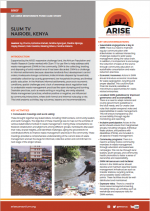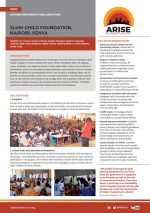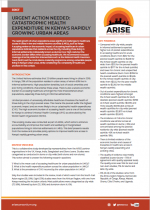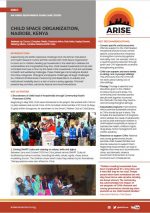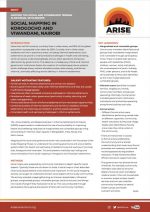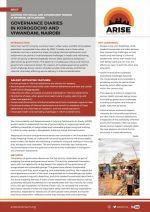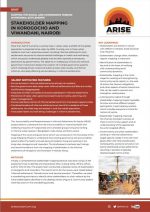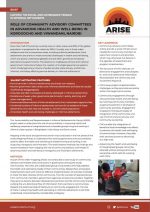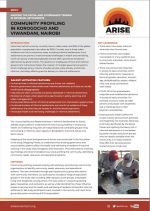Supported by the ARISE responsive challenge fund, the African Population and Health Research Center worked with Slum TV to use film to help address solid waste management (SWM) in the community. SWM is the collecting, treating and disposing of solid material once it has been discarded. SWM is a challenge in informal settlements because: absentee […]
Supported by the ARISE Responsive Challenge Fund, the African Population and Health Research Centre worked with Slum-Child Foundation (SCF) to address water, sanitation and hygiene (WASH). Clean water often costs more in informal settlements when it is provided by intermediaries, reducing the amount of water people can afford for handwashing. With a lack of space, […]
Supported by the ARISE responsive challenge fund, the African Population and Health Research Centre (APHRC) worked with the U-Tena youth organization to address solid waste management (SWM). SWM entails collecting, treating, and disposing of solid material that is discarded because it has served its purpose or is no longer useful. SWM is a challenge in […]
This brief on catastrophic health expenditure in Kenya’s rapidly growing urban areas look at how the rapid growth of urban populations poses significant challenges to healthcare access in cities in low and middle-income countries (LMICs), such as Kenya. A scoping review on the economic impact of accessing healthcare in urban populations indicates that residents across […]
Supported by the ARISE Responsive Challenge Fund, the African Population and Health Research Centre (APHRC) worked with Child Space Organization to reach out to children heading up households in the attempt to address the vulnerabilities and marginalities they face. Child headed households (CHHs) refer to families that have a minor as the head of the […]
The Accountability and Responsiveness in Informal Settlements for Equity (ARISE) project seeks to understand the role of accountability in improving health and wellbeing inequities of marginalised and vulnerable groups living and working in informal urban spaces in Bangladesh, India, Kenya and Sierra Leone. Mapping of the social and governance terrain was conducted in the first […]
The Accountability and Responsiveness in Informal Settlements for Equity (ARISE) project seeks to understand the role of accountability in improving health and wellbeing inequities of marginalised and vulnerable groups living and working in informal urban spaces in Bangladesh, India and, Kenya and Sierra Leone. Mapping of the social and governance terrain was conducted in the […]
The Accountability and Responsiveness in Informal Settlements for Equity (ARISE) project seeks to understand the role of accountability in improving health and wellbeing inequities of marginalised and vulnerable groups living and working in informal urban spaces in Bangladesh, India, Kenya and Sierra Leone. Mapping of the social and governance terrain was conducted in the first […]
The Accountability and Responsiveness in Informal Settlements for Equity (ARISE) project seeks to understand the role of accountability in improving health and wellbeing inequities of marginalised and vulnerable groups living and working in informal urban spaces in Bangladesh, India, Kenya and Sierra Leone. Mapping of the social and governance terrain was conducted in the first […]
The Accountability and Responsiveness in Informal Settlements for Equity (ARISE) project seeks to understand the role of accountability in improving health and wellbeing inequities of marginalised and vulnerable groups living and working in informal urban spaces in Bangladesh, India and, Kenya and Sierra Leone. Mapping of the social and governance terrain was conducted in the […]
